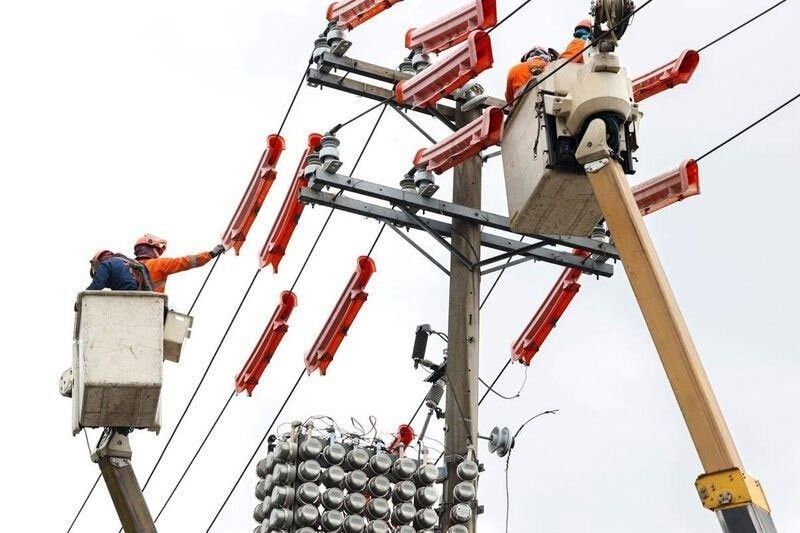Calling the bill decoupling the franchise of Manila Electric Company (Meralco) as counterproductive and unsettling to the business community, the leader of the Federation of Philippine Industries (FPI) has asked the House to stop this move, as it would stall business expansion and discourage investors from coming into the country.
Jesus Arranza, FPI chair, said his federation staunchly opposes the “vicious attack’”on one of its members which is “against the principles of what we stand for, stability in the business environment.”
Founded in 1903 by Detroit-based businessman, Swift, Meralco was first Manila Electric Railroad and Light Company which began with a tramway that year and the following year had its first electrical power operations by acquiring La Electricista.
It abandoned its railway operations which was destroyed by the war in 1948 and focused on providing electricity. By 1961, Filipino investors led by Eugenio Lopez Sr. bought Meralco from its American owners and built electric-generating and distributing facilities to meet the burgeoning needs of its franchise area. Meralco was the first Philippine company to issue mortgage trust indenture bonds in the US financial market on Wall Street.
In 1969, it sold its generating facilities to the National Power Corp. but retained its electric distribution as core business. In the first half of the 1980s, its franchise area tripled from 2,678 sq. km. to 9,337 sq. km. because provincial consumers preferred its rates and service over other alternatives.
Upon request of the government, in 1980 it operated the country's first elevated light rail transit from Baclaran to Caloocan (just like its prewar role) and at the end of the decade turned over to government an efficiently functioning LRT.
Currently, Meralco is the largest electric distribution company with a franchise area of 9,685 sq. km. encompassing 36 cities and 75 municipalities, including Metro Manila, all Rizal provinces, Cavite and Bulacan and parts of provinces of Pampanga, Batangas, Laguna and Quezon.
Some lawmakers want to split the franchise area of Meralco's monopolistic operation because of poor service and abuses like overbilling, which previously had been denounced by some consumers groups.
“If there are issues against Meralco or any member of the energy industry, is it not the Department of Energy and the Energy Regulatory Commission (ERC) who should resolve this,” Arranza stressed. (Top officials of ERC have been suspended for six months by the Ombudsman for stalling on major issues filed before them.)
Earlier in November, Sta. Rosa City, Laguna Representative Dan Ramon Fernandez, vice chair of the House Committee on Energy, accused Meralco of using a weighted average cost of capital (WACC) – to determine the return it should be getting to ensure its operations – that was too high and passing this on to customers.
Fernandez claimed that Meralco’s 14.97 percent WACC set in 2010 was no longer accurate and hence, should be cut down to 9.23 percent, thereby lowering the electric bills of consumers.
The solon alleged that Meralco and the ERC were conniving to make bigger profits. But Meralco claimed that their rates and service are monitored strictly by ERC and that their records show that they have always complied with or outperformed he service levels expected from them.
Meralco Vice President Jose Zaldarriaga, who heads the Corporate Communications, in a statement, said “as far as our rates are concerned, records will also show that at current levels Meralco’s charges are lower than many jurisdictions in the country, which is the reason why some areas are clamoring for Meralco’s service.”
FPI’s Arranza said the issue of Meralco’s WACC should be left to the power regulator to decide on the matter, Inquirer reported.
Opposition to franchise renewal
Fernandez is also opposing the early extension of Meralco's franchise, which is yet to expire in 2028, but which is being lobbied now by business groups.
In the May hearing of the committee on legislative franchises, Fernandez noted the questionable actions of Meralco that he believed led to the increased rates.
“Meralco says there’s light in life, but in reality, Meralco hid in the dark the abuses against consumer rights,” Fernandez was quoted by Politiko.
He asked Meralco to answer allegations of overcharging and its questionable actions such as awarding power supply agreements (PSAs) to companies associated with its mother company, the MVP group; and expanding its service area outside the National Capital Region without securing approval from Congress.
The lawmaker added that Meralco’s rate-setting per kilowatt hour (kWh) is heavily influenced by the weighted average cost of capital (WACC), which remains high at 14 percent and has not been adjusted.
He said that WACC is used as the basis for the rate of return of investment instead of using the return of rate base (RORB), which would make power rates more reasonable.
“For these reasons, we strongly oppose the early renewal of Meralco’s legislative franchise,” Fernandez added.
He said the House should study whether to renew Meralco’s franchise or divide it into three to ensure better services in areas.
“Instead of trying to renew their franchise, I will propose that we divide their franchise so that there will be real competition,” the solon stressed.
‘Big disservice’
Arranza said should Congress reject Meralco’s franchise renewal push, it would be “extremely counterproductive” and “a big disservice to Filipinos” as businesses take a hit from power interruptions as they result in losses.
Other groups that are lobbying for Meralco’s franchise renewal are the Management Association of the Philippines and the Makati Business Club.
But consumer advocacy group,People for Power (P4P) coalition, questioned the early push for franchise renewal, saying “renewing Meralco’s franchise too soon would remove the ability of the government to hold them to account and protect consumers.”
#WeTakeAStand #OpinYon #FPI #ERC #P4P #MERALCO
